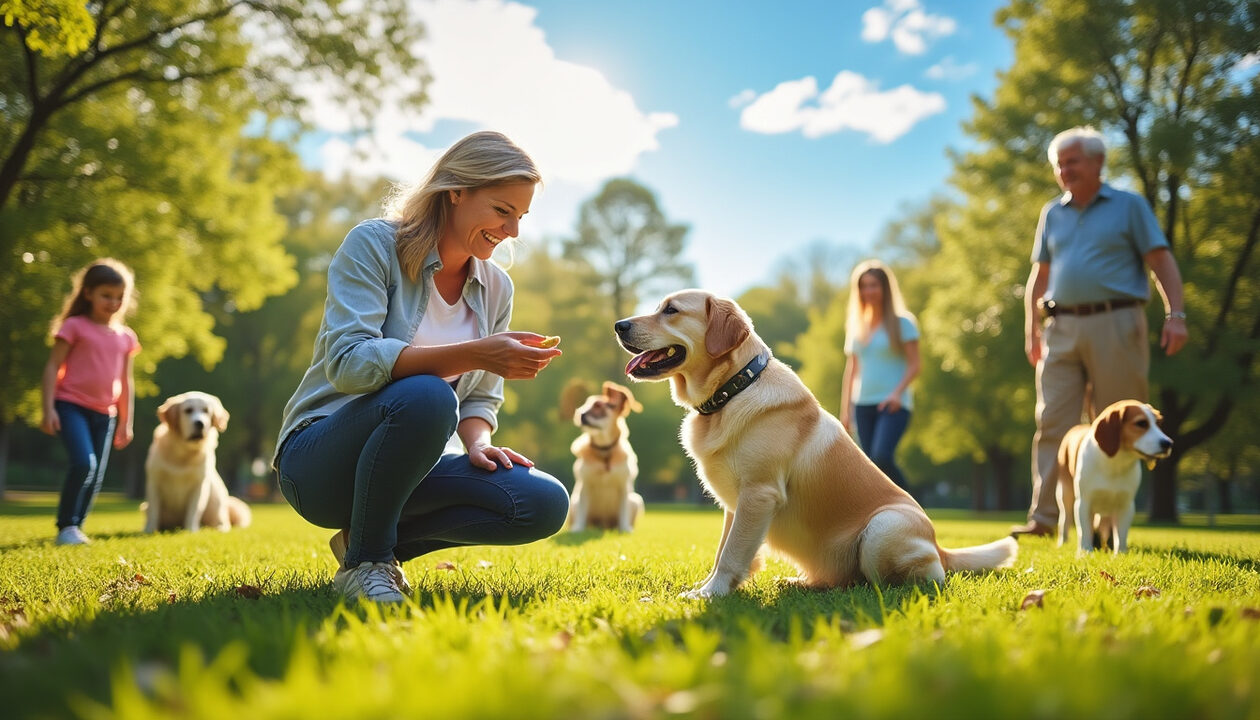What are the benefits of successful dog training?
The challenges of dog training can often frustrate owners who wish to see their four-legged companions obey. Training dogs is crucial not only for their well-being but also for that of their owners. Talking about the benefits of dog training involves discussing the many ways good training fosters harmonious coexistence. Positive dog training has emerged as the favored method, promoting trust between the owner and the animal while making learning fun. Modern dog training methods bring a fresh breeze to this field, making training both accessible and effective. Together, we will explore the main benefits of successful dog training.
The foundations of dog training
Dog training is a crucial step in developing a balanced canine behavior. Far from being a mere formality, this step is vital for strengthening the bond between the animal and its owner. Indeed, establishing good training requires both method and patience. Owners must recognize the importance of the different techniques used to train their dog. Training is not just about teaching commands; it initiates a genuine dialogue between humans and animals. At the heart of this approach, the method of positive reinforcement proves to be more than effective.

The principles of positive training
The dog training through positive reinforcement has demonstrated, over the years, its undeniable benefits. This method involves rewarding desired behaviors rather than punishing undesirable ones. By using treats, praise, or even games, we positively reinforce the reactions we want to encourage in our animal. This not only fosters learning but also creates an atmosphere of trust. The animal thus associates obedience with a pleasant experience, making education more intuitive and engaging.
It is crucial to choose the rewards wisely, as each dog has its own preferences. Brands like Royal Canin offer a wide range of treats suitable for your companion’s nutritional needs, which can be useful in dog training.
The social and emotional benefits of successful training
A successful dog education goes beyond obedience; it has significant implications for the social and emotional development of the dog. Well-trained dogs are generally less anxious and react less aggressively to various situations. This is particularly beneficial in our daily interactions, whether on walks in the city or visiting friends.
The trust between the owner and the animal
When you succeed in training your dog, you strengthen its trust in you. This bond of trust facilitates better communication, essential for peaceful coexistence. Your dog will feel safer, encouraging it to express itself, whether through barking or play. This process not only improves its social skills but also makes behavior management easier.
Moreover, successful training helps reduce stress, both in the dog and the owner. Fewer tensions arise in this shared environment, and the time spent together becomes more cherished. Studies show that positive dog training reduces anxiety and promotes a playful approach to learning. This calming atmosphere sets the framework for a balanced relationship between humans and animals.
Dog training and daily well-being
Successful dog training can significantly impact daily life. First, a well-trained dog is easier to manage: it knows how to walk on a leash, obey basic commands, and interact appropriately with other dogs. These skills are particularly important during walks. Training also prevents destructive behaviors at home, often caused by boredom. When your dog knows what to do, it feels more fulfilled and its happiness reflects that.
Impacts on physical and mental health
Beyond social interactions, good dog training contributes to your companion’s physical and mental well-being. A trained dog is generally more active and in better shape, and is less likely to develop undesirable behaviors, such as excessive barking or destruction at home. By ensuring your spaniel learns good manners, you provide it with the best chances for a fulfilling life in harmony with its environment.
Another unexpected aspect of dog training is its impact on the owner. Dog owners who invest in training often notice a decrease in stress. Sharing learning moments with their companion creates an atmosphere of complicity and happiness. Brands like Royal Canin offer resources and advice to help owners in this enriching adventure.
The challenges of dog training
Although dog training is beneficial in many ways, it can also pose challenges. Each dog is an individual with its own personality traits, and sometimes factors may hinder its learning. It is important to adopt a patient attitude and adjust training methods according to the particularities of the animal.
Anticipating difficulties and adapting
The context plays a crucial role in dog training. Walks in unfamiliar environments can cause anxiety in some dogs, complicating their learning. Being aware of these external factors allows for better adaptation of the training process. For example, overly stimulating environments may require shorter and more frequent learning sessions.
Finally, collaborating with a professional trainer can be wise. Seeking help from an expert in dog training can offer new perspectives and enhance the effectiveness of learning within your pair. Good practices and the support of an experienced trainer will guide you, especially when frustrating or abnormal behaviors arise.
Adopting a pet is an act of love; adding an educational dimension strengthens this bond. By working together, you will discover the benefits of dog training that go far beyond basic learning; you will establish a relationship full of respect, trust, and happiness. Well-designed walking routes, accompanied by appropriate training, will add a playful dimension to your daily life with your dog.
| Dog training elements | Benefits | Techniques |
|---|---|---|
| Obedience | Better management of interactions | Basic commands, educational games |
| Trust | Calmer relationships with other dogs and humans | Positive reinforcement, rewards |
| Well-being | Reduction of anxiety and stress | Socialization exercises, regular training sessions |




